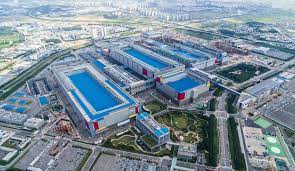In an ambitious South Korean national project to establish the largest semiconductor production base in the vicinity of the nation’s capital, Seoul, Samsung Electronics announced on Wednesday that it anticipates investing 300 trillion won ($230 billion) over the next 20 years.
By 2042, Gyeonggi Province will be home to a “mega cluster” of chip manufacturing facilities, five of which will be constructed by Samsung. According to the South Korean Ministry of Commerce, Industry, and Energy, it would endeavor to draw 150 additional businesses that make materials and components or create high-tech chips.
The company says its new operations will be close to its current domestic factories and will make both higher-margin logic chips with a wider range of functions and computer memory chips for storing data.
With the development of new technologies like 5G wireless networks, artificial intelligence, and self-driving cars, Samsung, a global leader in the memory industry, is attempting to increase its presence in sophisticated processors.
The semiconductor cluster is part of broader government initiatives unveiled on Wednesday to support six major technological sectors that the nation views as being most important for its economy that is heavily dependent on exports. In addition to semiconductors, they also contain biotechnology, robots, displays, and rechargeable batteries. Through 2026, the government aspires to attract 550 trillion won ($422 million) in corporate investment for these initiatives.
The initiative from South Korea comes as other technological giants like the United States, Japan, and China expand their domestic chip production while implementing protectionist policies, tax breaks, and hefty subsidies to entice investments. South Korean President Yoon Suk Yeol hailed the country’s technology industries as its “important economic growth engines, security, and strategic assets that are also closely linked to job creation and livelihoods” during a meeting with economic policymakers and business executives on Wednesday.
The Commerce Ministry said in a statement that although South Korea has “world-class manufacturing capabilities and technology in numerous high-tech industries, such as semiconductors, secondary batteries, and displays, (government) assistance and regulatory conditions have been insufficient.
The largest firm in South Korea, Samsung, has seen its profit fall precipitously in recent months as a poor global economy, shaken by Russia’s conflict with Ukraine and soaring inflation, lowered demand for its memory chips and consumer electronics items. The company’s profit for the three months ending in December decreased by close to 70%, in part as a result of clients reducing their inventory to reflect economic unpredictability and a dramatic decline in chip prices.
Another significant South Korean chipmaker, SK Hynix, posted an operational loss of 1.7 trillion won ($1.3 billion) for the three months ending in December. This was the company’s first negative quarterly result since 2012.


















